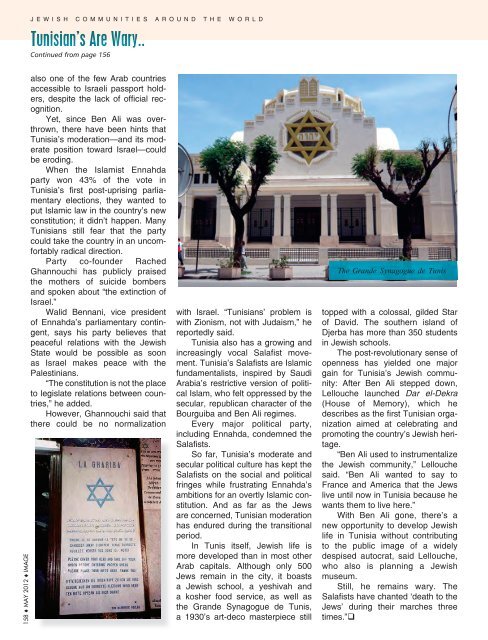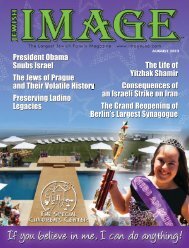Front cover.indd 1 4/26/2012 3:11:06 PM - Jewish Image Magazine
Front cover.indd 1 4/26/2012 3:11:06 PM - Jewish Image Magazine
Front cover.indd 1 4/26/2012 3:11:06 PM - Jewish Image Magazine
You also want an ePaper? Increase the reach of your titles
YUMPU automatically turns print PDFs into web optimized ePapers that Google loves.
J E W I S H C O M M U N I T I E S A R O U N D T H E W O R L D<br />
Tunisian’s Are Wary..<br />
Continued from page 156<br />
accessible to Israeli passport holders,<br />
despite the lack of official recognition.<br />
Yet, since Ben Ali was overthrown,<br />
there have been hints that<br />
Tunisia’s moderation—and its moderate<br />
position toward Israel—could<br />
be eroding.<br />
When the Islamist Ennahda<br />
party won 43% of the vote in<br />
Tunisia’s first post-uprising parliamentary<br />
elections, they wanted to<br />
put Islamic law in the country’s new<br />
constitution; it didn’t happen. Many<br />
Tunisians still fear that the party<br />
could take the country in an uncomfortably<br />
radical direction.<br />
Party co-founder Rached<br />
Ghannouchi has publicly praised<br />
the mothers of suicide bombers<br />
and spoken about “the extinction of<br />
Israel.”<br />
Walid Bennani, vice president<br />
of Ennahda’s parliamentary contingent,<br />
says his party believes that<br />
peaceful relations with the <strong>Jewish</strong><br />
State would be possible as soon<br />
as Israel makes peace with the<br />
Palestinians.<br />
“The constitution is not the place<br />
to legislate relations between countries,”<br />
he added.<br />
However, Ghannouchi said that<br />
there could be no normalization<br />
158 t MAY <strong>2012</strong> t IMAGE also one of the few Arab countries<br />
with Israel. “Tunisians’ problem is<br />
with Zionism, not with Judaism,” he<br />
reportedly said.<br />
Tunisia also has a growing and<br />
increasingly vocal Salafist movement.<br />
Tunisia’s Salafists are Islamic<br />
fundamentalists, inspired by Saudi<br />
Arabia’s restrictive version of political<br />
Islam, who felt oppressed by the<br />
secular, republican character of the<br />
Bourguiba and Ben Ali regimes.<br />
Every major political party,<br />
including Ennahda, condemned the<br />
Salafists.<br />
So far, Tunisia’s moderate and<br />
secular political culture has kept the<br />
Salafists on the social and political<br />
fringes while frustrating Ennahda’s<br />
ambitions for an overtly Islamic constitution.<br />
And as far as the Jews<br />
are concerned, Tunisian moderation<br />
has endured during the transitional<br />
period.<br />
In Tunis itself, <strong>Jewish</strong> life is<br />
more developed than in most other<br />
Arab capitals. Although only 500<br />
Jews remain in the city, it boasts<br />
a <strong>Jewish</strong> school, a yeshivah and<br />
a kosher food service, as well as<br />
the Grande Synagogue de Tunis,<br />
a 1930’s art-deco masterpiece still<br />
The Grande Synagogue de Tunis<br />
topped with a colossal, gilded Star<br />
of David. The southern island of<br />
Djerba has more than 350 students<br />
in <strong>Jewish</strong> schools.<br />
The post-revolutionary sense of<br />
openness has yielded one major<br />
gain for Tunisia’s <strong>Jewish</strong> community:<br />
After Ben Ali stepped down,<br />
Lellouche launched Dar el-Dekra<br />
(House of Memory), which he<br />
describes as the first Tunisian organization<br />
aimed at celebrating and<br />
promoting the country’s <strong>Jewish</strong> heritage.<br />
“Ben Ali used to instrumentalize<br />
the <strong>Jewish</strong> community,” Lellouche<br />
said. “Ben Ali wanted to say to<br />
France and America that the Jews<br />
live until now in Tunisia because he<br />
wants them to live here.”<br />
With Ben Ali gone, there’s a<br />
new opportunity to develop <strong>Jewish</strong><br />
life in Tunisia without contributing<br />
to the public image of a widely<br />
despised autocrat, said Lellouche,<br />
who also is planning a <strong>Jewish</strong><br />
museum.<br />
Still, he remains wary. The<br />
Salafists have chanted ‘death to the<br />
Jews’ during their marches three<br />
times.”<br />
Section 05.<strong>indd</strong> 158 4/<strong>26</strong>/<strong>2012</strong> 4:29:51 <strong>PM</strong>



